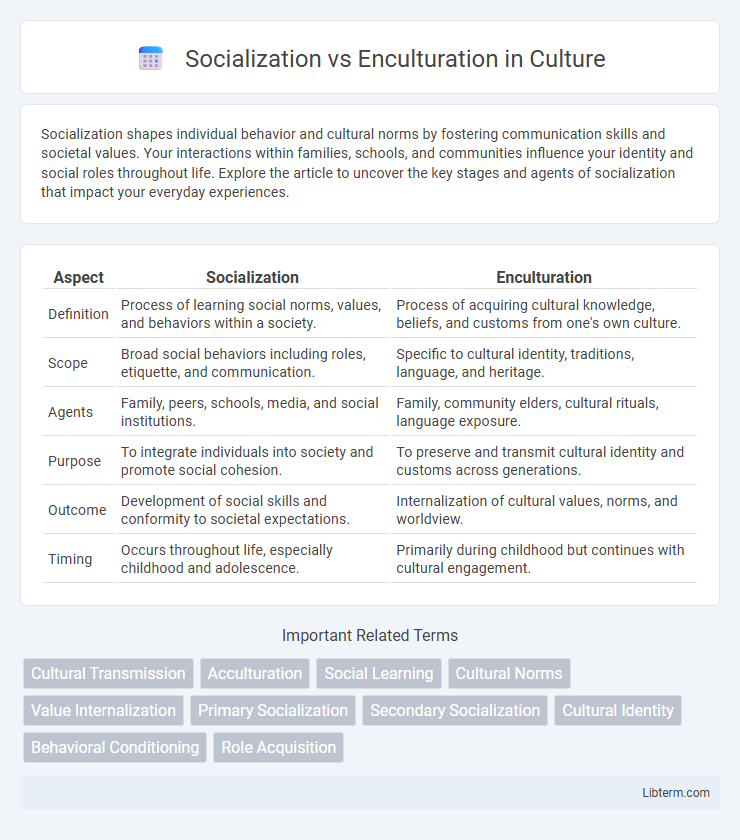Socialization shapes individual behavior and cultural norms by fostering communication skills and societal values. Your interactions within families, schools, and communities influence your identity and social roles throughout life. Explore the article to uncover the key stages and agents of socialization that impact your everyday experiences.
Table of Comparison
| Aspect | Socialization | Enculturation |
|---|---|---|
| Definition | Process of learning social norms, values, and behaviors within a society. | Process of acquiring cultural knowledge, beliefs, and customs from one's own culture. |
| Scope | Broad social behaviors including roles, etiquette, and communication. | Specific to cultural identity, traditions, language, and heritage. |
| Agents | Family, peers, schools, media, and social institutions. | Family, community elders, cultural rituals, language exposure. |
| Purpose | To integrate individuals into society and promote social cohesion. | To preserve and transmit cultural identity and customs across generations. |
| Outcome | Development of social skills and conformity to societal expectations. | Internalization of cultural values, norms, and worldview. |
| Timing | Occurs throughout life, especially childhood and adolescence. | Primarily during childhood but continues with cultural engagement. |
Defining Socialization and Enculturation
Socialization is the lifelong process where individuals learn and internalize the values, norms, behaviors, and social skills necessary to function within their society. Enculturation refers specifically to the process by which individuals acquire the cultural knowledge, beliefs, customs, and language of their native culture from early childhood. While socialization encompasses learning across various social contexts, enculturation is primarily concerned with the transmission of cultural heritage and identity.
Key Differences Between Socialization and Enculturation
Socialization involves learning societal norms and behaviors through direct interaction within various social contexts, focusing on role acquisition and social skills development. Enculturation refers to the gradual process through which individuals absorb and internalize the values, customs, and cultural heritage of their community, primarily through family and tradition. While socialization emphasizes social roles and interpersonal skills, enculturation centers on cultural identity and transmission of inherited cultural knowledge.
The Role of Family in Socialization and Enculturation
The family serves as the primary agent in both socialization and enculturation, shaping an individual's behaviors, values, and cultural identity from early childhood. Through daily interactions, parents and siblings teach language, social norms, and cultural traditions, embedding societal expectations within the individual's worldview. This foundational role of the family ensures the transmission of cultural heritage while promoting social integration and personal development within a community.
Agents of Socialization: Schools, Peers, and Media
Schools, peers, and media serve as primary agents of socialization, shaping individuals' values, behaviors, and cultural norms through continuous interaction and exposure. Schools reinforce societal expectations and knowledge, peers influence identity and social skills development, while media provides vast, diverse cultural content that broadens perspectives and reinforces social roles. Together, these agents facilitate the internalization of social norms and the integration of individuals into their cultural environment.
Cultural Transmission Through Enculturation
Enculturation is the primary process of cultural transmission where individuals learn and adopt the behaviors, norms, values, and customs of their society through direct interaction and observation within their cultural environment. Unlike socialization, which encompasses a broader range of learning including social roles and interpersonal skills, enculturation specifically focuses on the internalization of cultural heritage essential for cultural continuity and identity formation. This process enables individuals to participate effectively in their community by embedding cultural knowledge and practices from one generation to the next.
The Impact of Socialization on Identity Formation
Socialization plays a critical role in shaping individual identity by internalizing societal norms, values, and roles through interactions within family, peers, and institutions. This process influences self-concept, behavioral patterns, and worldview, reinforcing cultural expectations and social cohesion. Identity formation through socialization is dynamic, continuously evolving as individuals adapt to diverse social contexts and experiences.
Enculturation and the Preservation of Cultural Values
Enculturation is the process by which individuals learn and adopt the values, norms, and customs of their culture, ensuring the preservation of cultural heritage across generations. This deep immersion in cultural practices fosters a strong sense of identity and continuity within communities, reinforcing traditions and social cohesion. Unlike socialization, which can involve adapting to multiple social settings, enculturation specifically emphasizes maintaining and transmitting culture-specific knowledge and values.
Socialization vs Enculturation: Real-Life Examples
Socialization involves learning behaviors and norms through interaction with family, peers, and institutions, such as a child adopting classroom etiquette or workplace professionalism. Enculturation occurs as individuals absorb cultural values and traditions from their community, exemplified by participating in religious ceremonies or celebrating national holidays. Both processes shape identity but socialization emphasizes active adaptation to social roles, while enculturation centers on the internalization of cultural heritage.
Challenges in Modern Socialization and Enculturation
Modern socialization faces challenges such as digital media influence, which alters traditional face-to-face interactions and impacts identity formation. Enculturation struggles with preserving cultural heritage amid globalization and multicultural environments, leading to potential loss of native customs and languages. Both processes must adapt to rapid technological changes and shifting societal values, complicating the transmission of norms and behaviors across generations.
Importance of Understanding Both Processes in a Globalized World
Understanding both socialization and enculturation is crucial in a globalized world as they shape individual behavior and cultural identity through internalizing societal norms and values. Socialization facilitates adaptation to new social environments by learning language, manners, and roles, while enculturation embeds deeper cultural beliefs and traditions essential for preserving heritage. Grasping these processes enhances cross-cultural communication, reduces conflicts, and promotes inclusivity in diverse international settings.
Socialization Infographic

 libterm.com
libterm.com